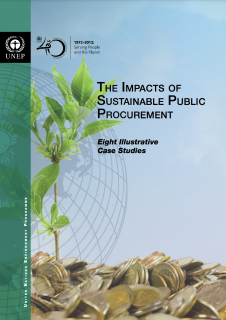
Public spending, which represents between 15 percent and 30 percent of GDP in a given country, can help drive markets towards innovation and sustainability, thereby enabling the transition to a green economy. It has become increasingly clear among policy makers that public procurement can play a strategic role, and that, it can specifically contribute to achieving the sustainable development goals (SDGs). With respect to environment, Sustainable Public Procurement (SPP) can allow governments to reduce greenhouse gas emissions, improve energy and water efficiency, and support recycling. Positive social results include poverty reduction, improved equity, and respect for core labor standards. And from an economic perspective, SPP can generate income, reduce costs and support the transfer of skills and technology.
Aware of these potential benefits, an increasing number of countries, local authorities, businesses and organizations are gradually embarking on sustainable procurement. Nevertheless, the emergence of SPP does not seem to be matched by a sufficient assessment of the impacts of SPP activities on sustainable development or on market transformation. The measure of these impacts is critical to evaluate current activities and to encourage new countries and organizations to join the global movement towards SPP.
This study addresses the lack of assessment of SPP activities by analysing eight SPP contracts to contribute to the development of an impact evaluation methodology. The selected case studies, from developed and developing countries, demonstrate the tangible and measurable impacts of sustainable public procurement, and its support towards the achievement of economic, social, and environmental goals.
